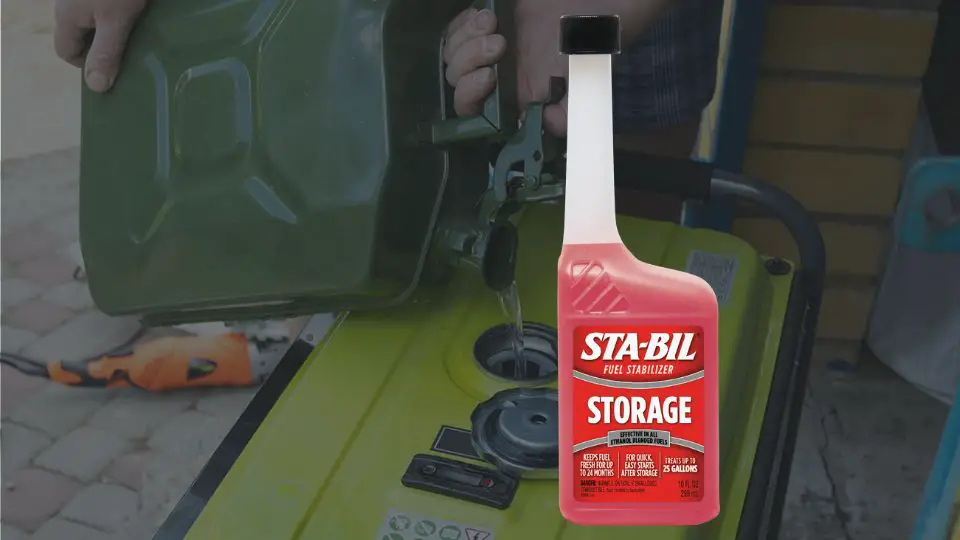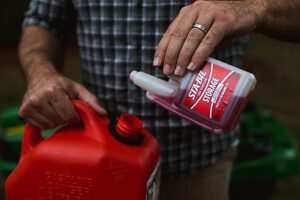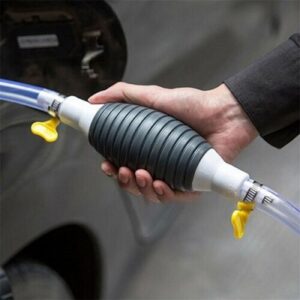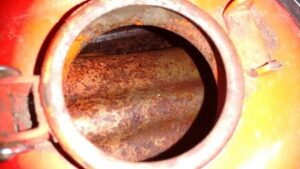This post may contain affiliate links. As an affiliate, we earn from qualifying purchases. We get commissions for purchases made through links in this post.
When using a gas generator you should always keep its fuel in good condition. Old gasoline can be harmful to the engine and fuel system. Therefore, it is important to know how long gas lasts in a generator before going bad.
Gasoline has a huge disadvantage when compared to diesel fuel or propane as it will quickly start losing octane and its combustion properties. Generally, if stored without a fuel stabilizer, expect gas to start to degrade due to oxidation and evaporation in about 3 to 6 months.
After that, fuel will start to form gum residue on the engine components and/or clogging in the generator’s fuel line. This is why it’s important to use fuel stabilizers when storing gas in a generator for longer periods.
How long can gasoline sit in a generator before it goes bad?
When the gas has been stored for more than 12 months, you should avoid starting a generator and take steps to replace it or at least refresh it. This includes draining all the gas and cleaning the tank and fuel system. Read on to find out how to replace old gasoline.
Keeping gas in a generator in good condition requires regular rejuvenation or using fuel stabilizers. However, fuel stabilizer is not a miracle solution and even with it you should expect gasoline to degrade over time. Fuel stabilizers work by slowing down the oxidation and evaporation process of gas so it can last for up to 24 months.
Can you use 2-year-old gas in a generator?
It is strongly advised not to use gas that has been stored in a generator for longer than 24 months. Even if you applied plenty of stabilizers, it will not prevent gasoline from degrading over 2 years. This is just too long and the best advice is for you to completely replace the gas in a fuel tank of a generator even if it’s been there just a bit less than 2 years. You don’t want to have to fix your generator engine because of running it for a few minutes on ancient gasoline.
What happens if you put bad gas in a generator?
Using gas that has already gone bad can and will be harmful to your generator’s fuel system and engine. It can cause the carburetor and pistons to become clogged, a fuel pump failure, and fuel line blockage. It will also decrease the performance of your generator and may cause an engine to halt.
Degraded gas can damage the carburetor and the fuel injection pump, and also affect generator performance. In addition to having your generator fail when you need it the most, it will most likely require costly repairs that you don’t want.
The best advice is to never run your generator on gas that’s been stored for more than 24 months. Even if fuel stabilizers have been used, the fuel should be drained and replaced with fresh ones from fuel stations.
How do I know if the gas is bad in my generator?
The symptoms of stale gas include:
- poor combustibility
- difficulty starting
- sputtering
- reduced performance
- inconsistent idle RPM
- frequent stalling
- pinging sounds
Another way to identify bad gas is to visually inspect it. As gasoline oxidizes over time and may become darker in color and develop a sour smell. If you suspect that your gas may be bad, you can pour a small amount into a clear glass container and compare it to fresh gas. If the old gas is noticeably darker than the fresh gas, it’s a good indication that it has gone bad.
How do I get rid of old gas in my generator?
If you have old gas in your generator, it’s important to dispose of it properly to ensure your safety and the safety of the environment.
Here are a few steps you can take to get rid of old gas in your generator:
- Turn off the generator: Before attempting to remove the old gas, make sure your generator is turned off and cool to the touch.
- Drain the gas tank: Using a fuel siphon pump, drain the old gas from the generator’s fuel tank into a bucket or a gas can. Another, better way to drain all the gas is by removing a fuel filter from the fuel line and letting all the gas flow through the hose connected to a fuel tank.
- Dispose of the old gas: Do not dispose of old gas by pouring it down the drain or into the trash. Check with your local recycling center or hazardous waste disposal facility.
- Clean the fuel tank: Once you’ve removed all the old gas, add the fuel system cleaner and fill up the tank with fresh gas.
- Run your generator: Make sure to put some load on it (at least 25%) and let the fuel system cleaner do its job when you run a generator normally.
- Make sure to regularly refresh gas or add a stabilizer if you plan on long storage of your generator with gas in it.
By following these steps, you can safely dispose of old gas in your generator and ensure that it runs smoothly and efficiently with fresh gas.
Is it OK to let the generator run out of gas?
No, it is highly advised against running your generator dry. Not only this can cause damage to sensitive electronic devices plugged into a generator, but it can cause the malfunction of the generator fuel line and engine.
Firstly, running your generator out of gas can cause air to enter the fuel system, which can cause damage to the fuel pump or carburetor. Secondly, air can cause the fuel system and a tank to dry out, which can lead to corrosion.
Additionally, running your generator out of gas can cause damage to the engine because when the generator runs out of gas, the engine may continue to run for a short time before it stops.
In summary, it’s not recommended to let your generator run out of gas completely. Make sure to keep the gas tank filled for at least a quarter to ensure your generator operates safely.
Can old gasoline be revived?
Old gasoline (a year and more) has already lost a significant part of its octane and is generally recommended to get disposed of. However, if you are still up to it, you can try rejuvenating it by adding a new gas with a proportion of 1/4 (one old and four fresh gas), then infusing it with an octane booster.
However, doing so is still not recommended as there is too much hassle and quite some costs associated with it. The best decision is to replace old gasoline altogether and make sure to add a fuel stabilizer to make sure it lasts much longer and you won’t need to bother trying to restore a degraded gas later.
What is the best gas to use in a generator?
The best gas to use in a generator is regular unleaded gasoline with an octane rating of at least 87(which is regular in the US). This is the most common type of gasoline available at gas stations and is suitable for use in most portable generators.
It’s important to avoid using gasoline blends that contain more than 10% ethanol, such as E15 or E85, as they can cause damage to the engine and fuel system components over time. Ethanol can attract moisture, which can cause corrosion and other issues in the fuel system. It is best to always use a non-ethanol premium gas as much as possible.
In addition to using the right type of gasoline, it’s also important to keep it fresh. Gasoline has a shorter shelf life compared to other fuel types, especially if it’s stored for long periods, and can cause problems or damage to your generator. To ensure the best performance and longevity of your generator, make sure to refresh gasoline every 30 days or simply add a fuel stabilizer for peace of mind.
A side note: If you often store the fuel in your generator for more than 3-6 months, consider using a diesel or propane-powered generator instead. The latter can be stored indefinitely.







3 thoughts on “How long does gas last in a generator?”
Comments are closed.